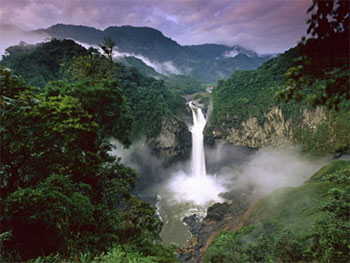It’s a sad day in Ecuador and for everyone around the world that saw a dash of hope in an otherwise crazed world that’s willing to risk our climate and biodiversity for money from fossil fuels.
Last week, Ecuador’s parliament voted to allow oil drilling in the midst of what scientists call the most biodiverse region in the world and home to several indigenous tribes (some with no contact to the modern world). Yasuni National Park is a World Biosphere Reserve and the world’s greatest carbon sink and oxygen supplier.

Hailed as a model for not extracting oil from the ground, in 2008 President Correa announced Yasuní National Park would be closed to oil drilling, where an estimated 846 million barrels lay untapped – its largest oil reserve.
But only if developed nations chipped in $3.6 billion to pay the government to leave the oil in the ground – half the oil’s value – by 2023.
"We still have to collect the funds for the initiative to become a reality," said Ecuador’s Vice-President Lenín Moreno at the time. "We need industrialized countries to understand, in a spirit of shared responsibility, that what we have decided this historic morning is a sacrifice for our country."
Ecuador received just $13.3 million out of $336 million in pledges, but it’s still 10 years until 2023 and the world has been in a recession.
"While the governments of other developing countries, such as Indonesia and Turkey and neighboring Colombia and Chile, pledged their support, the U.S., China, UK and Japan all officially stood on the sidelines. (Individual contributions have come from at least 11 countries though, including the U.S., UK and Japan.) The Italian, Spanish and a regional government in Belgium led the way in commitments and deposits, but Germany never backed the fund and disagreed with the premise. However, earlier this year Germany and Ecuador did reach an agreement amounting to 34.5 million euros in support of forest protection and the UN’s Reducing Emissions from Deforestation and Forest Degradation. Responding to German criticism over the Yasuni decision, that deal has now been unilaterally canceled by the Correa government," notes Adam Chimienti on EcoWatch.
Calling it one of his most difficult decisions, Correa said in a televised speech: "The world has failed us. It was not charity that we sought from the international community, but co-responsibility in the face of climate change."
"The country cannot be beggars sitting on a sack of gold," he says, also referring to an open pit copper mine that’s under development in another area of Ecuador.
President Correa says the government needs the money to combat poverty. He says conditions will be attached to protect the indigenous population and that only .1% of the Yasuni will be opened to drilling.
Correa has won broad popular support among Ecuador’s low-income majority by heavily spending on welfare, health, education and infrastructure projects, reports Huffington Post.
Protests are on-going and some 680,000 people have signed a petition calling for a referendum.
For someone who feels so badly about the decision, Correa’s reactions to protests is strange:
"The government is reacting furiously against the protesters, even resorting to violent police repression. All sorts of threats have been announced including controlling social media and leaving students out of school if they dare to participate in demonstrations. President Correa even reacted through his Twitter account against international commentators who showed their disapproval. Everybody who is not with the government is automatically considered its enemy."
About half to two-thirds of Ecuador’s oil is imported into the US.
Ecuador’s World Leading Constitution
How can oil drilling go forward when it violates Ecuador’s Constitution?
In 2008, Ecuador became the first country in the world to codify the rights of nature into its constitution. Known as the Green Constitution, it recognizes the inalienable rights of ecosystems to exist and flourish, gives people the authority to petition on the behalf of ecosystems, and requires the government to remedy violations of these rights. Bolivia is the only other country that’s done this.
It also specifically prohibits extraction of non-renewable resources in protected areas. Moreover, the constitution says, monocultures cannot be planted as reforestation or to rehabilitate the soil.
Oil Drilling in Ecuador
Oil drilling hasn’t been good to Ecuador. In what’s been called the worst ecological disaster in history, the country is just settling with Chevron after 20 years of systematically dumping 18 billion gallons of oil sludge into the rainforest.
Even after 40 years of oil extraction and destroying the rainforest, the country is still poor and owes $7 billion to China (over 10% of GDP), which has been financing more of its infrastructure.
Petroamazonas, the state-owned oil firm that would be in charge at Yasuni, admits there’s a weekly oil spill.
Read an in-depth explanation of the situation in Ecuador:

I will be encouraging all I know to not buy Chevron oil. The name means selfishness. I knew there was a good reason I did not join them when I graduated from college. I’m also making a commitment not to use oil-based products.